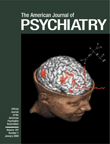Meige’s Syndrome Associated With Risperidone Therapy
Mr. A was a 43-year-old, single Caucasian male who became psychiatrically ill at age 22 years and had since been taking various neuroleptics. From 1980 to 1996, he was prescribed thioridazine, 50 mg/day. More recently, his thioridazine therapy was changed to treatment with risperidone, 6 mg/day, as a result of an exacerbation of his symptoms. Mr. A then started blinking frequently. Sometime later, he noted episodic blepharospasms that either occurred spontaneously or were triggered by stress. As a result, he had to discontinue vision-dependent activities such as driving. More recently, he sought help for blepharospasms.During an interview, Mr. A was noted to have intermittent blepharospasms that affected his vision. The more he tried to open his eyes, the more tightly his eyelids closed. He often struggled for about 3–5 minutes to open his eyes.
References
Information & Authors
Information
Published In
History
Authors
Metrics & Citations
Metrics
Citations
Export Citations
If you have the appropriate software installed, you can download article citation data to the citation manager of your choice. Simply select your manager software from the list below and click Download.
For more information or tips please see 'Downloading to a citation manager' in the Help menu.
There are no citations for this item
View Options
View options
PDF/ePub
View PDF/ePubGet Access
Login options
Already a subscriber? Access your subscription through your login credentials or your institution for full access to this article.
Personal login Institutional Login Open Athens loginNot a subscriber?
PsychiatryOnline subscription options offer access to the DSM-5-TR® library, books, journals, CME, and patient resources. This all-in-one virtual library provides psychiatrists and mental health professionals with key resources for diagnosis, treatment, research, and professional development.
Need more help? PsychiatryOnline Customer Service may be reached by emailing [email protected] or by calling 800-368-5777 (in the U.S.) or 703-907-7322 (outside the U.S.).

